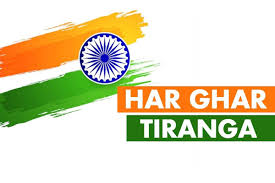
Table of Contents
The “Har Ghar Tiranga” campaign, initiated by the Indian government, aimed to foster patriotism by encouraging citizens to hoist the national flag at their homes. This initiative, launched as part of the Azadi Ka Amrit Mahotsav celebrations marking India’s 75th Independence Day, sought to instill a sense of national pride and unity.
The “Har Ghar Tiranga” Campaign
The “Har Ghar Tiranga” campaign was designed to promote the display of the Indian flag across the country. The government encouraged every household to proudly display the tricolor, symbolizing unity and national pride. The campaign included a series of events, social media promotions, and public appeals, aiming to make the flag an omnipresent symbol of Indian identity during the Independence Day celebrations.
Congress Party’s Critique
In a recent development, the Congress party has taken a critical stance on the “Har Ghar Tiranga” campaign, using it as a platform to question Prime Minister Narendra Modi’s motivations and to highlight historical associations of the RSS, the ideological parent of the ruling Bharatiya Janata Party (BJP). The Congress has argued that the campaign, while seemingly patriotic, is also a vehicle for the ruling party to further its own political agenda and to distract from historical and contemporary issues Har Ghar Tiranga.
Congress’s ‘Short History’ of RSS
The Congress party’s critique involves a historical examination of the RSS and its founder, Keshav Baliram Hedgewar, highlighting aspects of the organization’s past that it believes are incongruent with the values celebrated during Independence Day. The Congress has shared a ‘short history’ of the RSS to challenge the credibility of the ruling party’s patriotism and to question the alignment of their values with the Indian flag’s symbolism.
- Founding and Ideological Roots:
It was established during a period of intense political and social activity in India, including the struggle for independence from British colonial rule. The RSS has been described as a Hindu nationalist organization, with its primary objective being the promotion of Hindu cultural and social values. Critics, including the Congress party, argue that the RSS’s focus on Hindu nationalism contrasts with the secular and pluralistic values enshrined in the Indian Constitution. - Historical Controversies:
The Congress party has pointed to several controversial moments in the RSS’s history. One of the most significant criticisms is the RSS’s alleged association with Mahatma Gandhi’s assassination. Nathuram Godse, the assassin, was reportedly a member of the RSS. Although the RSS was banned for a short period following the assassination, it was later reinstated after a court ruling that cleared it of direct involvement. The Congress has used this historical episode to question the RSS’s commitment to the values of non-violence and unity. - Post-Independence Activities:
Following India’s independence, the RSS has been involved in various socio-political activities, often aligning itself with conservative and nationalist causes. The Congress party has criticized the RSS’s role in promoting a vision of India that it views as exclusionary or divisive. The RSS’s support for certain political agendas and its involvement in controversies, such as the Ram Janmabhoomi movement and the promotion of Hindutva, are highlighted by the Congress as evidence of its departure from the secular ideals of the Indian state. - Current Political Climate:
In recent years, the RSS has become closely associated with the BJP, the ruling party led by Prime Minister Narendra Modi. The Congress party argues that the BJP’s political strategies and campaigns, including the “Har Ghar Tiranga” initiative, reflect the RSS’s ideological influence. The Congress has raised concerns that such initiatives are used to bolster the BJP’s political capital while diverting attention from pressing issues such as economic challenges, social inequality, and governance failures. Congress’s Argument and Strategy
The Congress party’s critique of the “Har Ghar Tiranga” campaign and its historical commentary on the RSS serve multiple purposes:
- Political Discourse:
By highlighting the RSS’s controversial past, the Congress aims to challenge the BJP’s narrative of patriotism and nationalism. The Congress contends that the ruling party’s attempt to project itself as the sole guardian of national pride is undermined by its association with an organization that they view as having a divisive legacy. - Diversion from Key Issues:
The Congress argues that the campaign is a diversion from more pressing issues facing the country, such as economic performance, unemployment, and social discord. By focusing on the campaign’s political dimensions, the Congress seeks to draw attention to what it perceives as the government’s shortcomings and failures. - Engaging the Electorate:
The Congress’s critique is also a strategic move to engage voters who may be disillusioned with the current government. By questioning the authenticity of the BJP’s patriotism and highlighting its ideological roots, the Congress hopes to galvanize support from those who prioritize secularism and inclusivity. Public and Political Reactions
The Congress party’s position on the “Har Ghar Tiranga” campaign has elicited varied responses. Supporters of the Congress view the critique as a necessary counterpoint to the BJP’s narrative, emphasizing the importance of holding political leaders accountable to democratic values. Conversely, BJP supporters argue that the Congress’s focus on the RSS’s history is an attempt to undermine a patriotic initiative and distract from the positive impact of the campaign.
Conclusion
The “Har Ghar Tiranga” campaign has sparked a broader political debate, reflecting the ongoing ideological and political contestations in India. The Congress party’s critique, centered around the RSS’s historical associations and the perceived political motivations behind the campaign, underscores the complexities of India’s political landscape. As the campaign progresses, it will be essential to consider both the symbolic and substantive aspects of patriotism and how different political narratives shape national discourse. The historical context provided by the Congress highlights the ongoing debate over the nature of Indian identity and the role of nationalism in contemporary politics.







